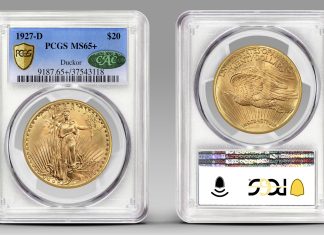The final trading session of this most eventful week began on a relatively upbeat note in precious metals, following yesterday’s rather minor (1.5% from the recent high in gold) setback, which, for now, we will refrain from calling a "correction."
 Crude oil rising past $103.00 on the back of continuing skirmishes in Libya, and a US dollar apparently stuck near the 76.40-76.50 zone on the trade-weighted index (and still at nearly a four-month low against the euro) gave rise to scattered early buying, but metals players were still cautious ahead of the 8:30 AM release of the US Labor Department’s employment data for February.
Crude oil rising past $103.00 on the back of continuing skirmishes in Libya, and a US dollar apparently stuck near the 76.40-76.50 zone on the trade-weighted index (and still at nearly a four-month low against the euro) gave rise to scattered early buying, but metals players were still cautious ahead of the 8:30 AM release of the US Labor Department’s employment data for February.
Spot gold dealings opened with a $3.60 gain on Friday morning, and they were quoted at the $1,418.90 indication price. Silver spot added 30 cents to open at the $34.53 level while platinum rose $3 to start the session off at the $1,828.00 mark per ounce. Palladium dropped by an equivalent amount, to open at $810 the troy ounce, while rhodium remained unchanged once again, and was quoted at $2,380.00 per ounce. Apple iPad junkies can now rejoice, as the Kcast Gold Live app can be with them 24/7365 wherever they might find themselves, and offer them the above-mentioned quotes, up to the minute.
Well, the February US joblessness rate came in at its lowest level since April of 2009 and it revealed a gain of 192,000 positions in February. The figure did miss the analysts’ estimates that had called for a gain of 218,000 jobs, but the overall US unemployment rate fell by one-tenth of a percent from January’s 9% level. Thus, early caution among commodity players dissipated somewhat on account of the 26,000 jobs-created-discrepancy between the USLD report and previous expectations, and the crowd set out to buy more gold and silver with a tad more confidence.
We are looking at probably another weekend ahead of which players might not want to go home without a safety lining in metals. However, book-squaring activities and any possible geopolitical developments could still make for a volatile session. Libya, oil, and the US dollar remain the top items on market participants’ minds.
Also on market participants’ minds this morning, were continuing reverberations from comments made by Mr. Trichet the other day. The ECB’s head sounded an even more than normally hawkish tone on Thursday as he intimated that interest rates in the euro zone could rise as early as April. Albeit the IMF warned against such a move, the ECB appears to have its mind made up that inflation -along the lines of its current trend- is not a welcome guest in the region’s economy. The word-pair "strong vigilance" was used by Mr. Trichet in his news conference, and analysts pointed out that this is historically the telltale sign of an imminent rate move.
Mind you, similar "signs" are also coming, not from the mind of M. Night Shyamalan, but from the US Fed at this time. Bloomberg reports that the Fed’s policy makers appear to be in favor of an "abrupt" ending to the QE2 program, when the end of June rolls around. The FOMC meets in eleven days, and that is about halfway through the bond-buying period that was instituted back in early November of last year. The Fed’s move came on the heels of a poor jobs and economic indicators’ scene in August, and it was seen as causing spec funds to run amok with certain commodity prices, drunken with the prospect of the ultra-cheap money environment that the Fed created for them for another six months or so, at least.
Now, however, the US economic picture has brightened considerably, and it has become fairly clear (at least to some) that the risks implicit in a prolonged easing stance are beginning to outweigh its benefits, especially when it comes to QE2 being "morphed" into QE2.5 or QE3 after mid-year. Even the full-run of QE 2 has come under questioning by some Fed members, but that fact has not stopped hard money newsletters from assuring their audiences that the Fed will continue with its current policies for, basically, …ever.
Reuters reports that according to Charlie Morris, head of absolute return at HSBC Global Asset Management, "the financial and geopolitical backdrop has not deteriorated enough for gold to show off its safe-haven credentials and it remains firmly a risk trade, while the chance to get into silver may have passed." Mr. Morris recently cut his fund’s level of exposure to gold. Mr. Morris also opined that "we’re at a crossroads and it’s a very complex time because on the one hand, you want to protect yourself against inflation, but those trades are extremely overcooked."
The HSBC fund manager has adopted a "defensive view of the world" and believes that gold "is not the best way to profit from that stance." However, HSBC Global Asset Management remains bullish overall on gold, even if it does not envision gold as the cure-all for what ails the world at the present time. And, while gold might be a good enough value to become a buyer near $1,340- $1,350 for Dennis Gartman, the famed newsletter editor remains on the sidelines of the market, for the time being, citing risks of further retreats in the yellow metal.
Someone else who shares that view is Mr. Bernanke. Whether or not related to the state of Utah’s proposed legislation to allow its denizens to use gold and silver coins as an alternative "legal tender," Mr. Bernanke commented that he dismisses the notion of the gold standard returning to the U.S., anytime soon.
The Fed Chairman noted in his testimony before the Senate Banking Committee that gold "did deliver price stability over long periods of time, but over shorter periods of time it caused wide swings in prices related to changes in demand or supply of gold. So I don’t think it’s a panacea."
Mr. Bernanke also remarked that the modern world could not re-adopt gold as its currency standard for one simple reason: there just is not enough gold in the world to effectively support the U.S. money supply. Of course, that’s the same reason for which Rep. Ron Paul has not only called for the abolishment of the Fed, but also for the return to the gold standard. While that debate goes on, what follow, are excerpts from our previous (in collaboration with the CPM Group) study "That was then, this is now" on the topic of said standard, monetary policy, and the prospects for gold’s return as currency:
"The issue of gold’s role in a monetary system has been resurrected in U.S. political discussions this past year, after having been dormant for more than two decades. Two developments have led to this. One has been the seemingly relentless decline of the dollar’s exchange rate in currency markets. The other has been the candidacy of Ron Paul as a Republican candidate for President of the United States. While Rep. Ron Paul was seen as having little chance of garnering the candidacy let alone the Presidency, he tapped into a wellspring of conservative discontent over financial management of the U.S. economy.
This was the first time that gold has played a role in U.S. Presidential politics since the Republican platform on which Ronald Reagan ran in 1980 carried a platform calling for a return to a watered-down gold standard for the dollar. That cynical proposal did not become a major issue during the campaign, and silently disappeared after the election.
The position of many advocates of a gold standard is that the Federal Reserve System ought to be abolished, that the U.S. government should allow private banks to issue currency as they see fit, and that the U.S. government should extract itself from the control of money supply in the United States. The problem is that the "good old days" never really existed. In the 65 years between the U.S. Civil War and World War One there were 16 recessions in the United States.
The concept and history of money and monetary policy in the United States always has been a point of strong opinions. When people have strong opinions about a topic, they often feel that it is acceptable to distort history and reality in order to justify their point. Thus, advocates of private banks issuing private money sometimes misquote Thomas Jefferson.
Jefferson famously said: "I believe that banking institutions are more dangerous to our liberties than standing armies. If the American people ever allow private banks to control the issue of their currency, first by inflation and then by deflation, the banks and the corporations that will grow up around them will deprive the people of all property until their children wake up homeless on the continent their fathers conquered."
In order to try to distort history and misrepresent one of the most knowledgeable American forefathers, people omit the word "private" from the preceding quotation, attempting to convince would-be supporters that Mr. Jefferson was opposed to the concept of a federally organized banking system, as outlined in the U.S. Constitution and envisioned by the founders of the nation. In fact, he was opposed to private banks having unrestrained capacity to issue money and build up debt, the very thing that caused much economic destruction in the period before the Civil War.
Anyone suggesting a return to the old ways of organizing and regulating a banking system and financial markets owes it to themselves and to those to whom they speak to know better the historical record of economic dislocations generated during such systems’ operations. The free banking period in U.S. history was an era of massive swings in economic volatility, far greater than those experienced since the 1940s, incorporating periods of massive depressions and recessions; hyper-inflation and massive deflations; economic destruction that destroyed humans, companies, and communities; and lightly to totally unregulated financial markets that make the villainy of recent banking scoundrels seem like misdemeanors."
Have a pleasant weekend, whatever standard you might prefer to be on.
Jon Nadler
Senior Analyst
Kitco Metals Inc.
North America
www.kitco.com and www.kitco.cn
Blog: http://www.kitco.com/ind/index.html#nadler










